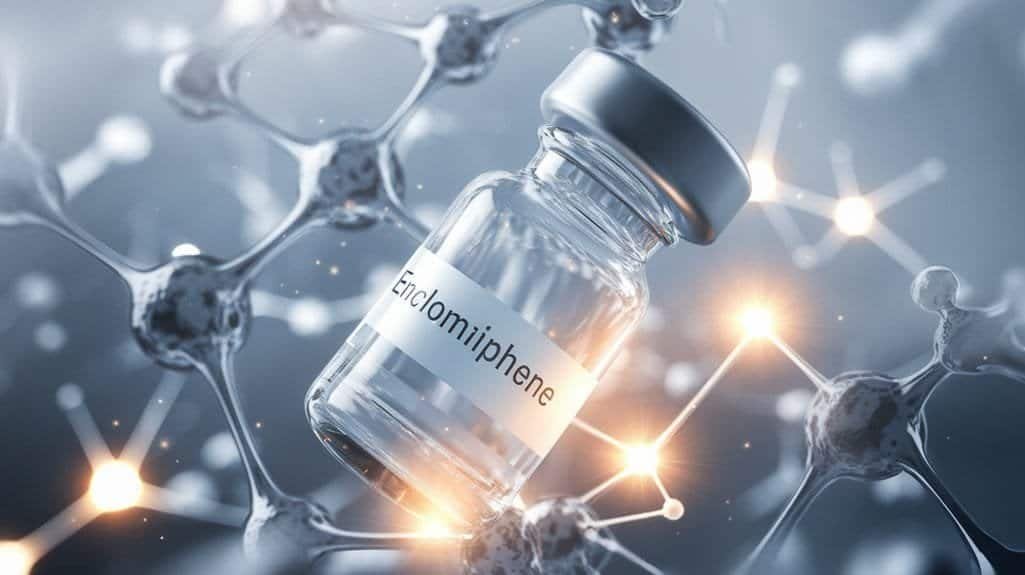Yes, enclomiphene increases testosterone levels by acting as an estrogen antagonist. This action disrupts the negative feedback on the hypothalamic-pituitary-gonadal (HPG) axis, leading to higher secretion of GnRH, LH, and FSH, which promotes natural testosterone production. Studies show men on enclomiphene can experience significant increases in testosterone levels, achieving normal ranges more effectively than testosterone gel. If you're curious about its effects on fertility and safety, there's more detailed information available.
Key Takeaways
- Enclomiphene acts as an estrogen antagonist, enhancing GnRH secretion and boosting endogenous testosterone production.
- Average testosterone levels can rise significantly, reaching around 450 ng/mL in men treated with enclomiphene.
- Approximately 60% of men using enclomiphene achieve normal testosterone levels, exceeding the effectiveness of testosterone gel.
- Clinical studies show an average increase of 108.55 ng/dL in total testosterone levels among men with low baseline levels.
- Enclomiphene also enhances sperm production, making it beneficial for men with hormonal imbalances and fertility concerns.
Mechanism of Action of Enclomiphene

As you explore the mechanism of action of enclomiphene, it's important to understand its effects on estrogen receptors.
Enclomiphene primarily exerts estrogen antagonism within the hypothalamus, disrupting the negative feedback loop that estrogen imposes on the hypothalamic-pituitary-gonadal (HPG) axis. By blocking these receptors, enclomiphene enhances the secretion of gonadotropin-releasing hormone (GnRH), which in turn stimulates the pituitary gland to release higher levels of luteinizing hormone (LH) and follicle-stimulating hormone (FSH).
This orchestrated response restores hormonal balance and facilitates endogenous testosterone production by the testes. Remarkably, enclomiphene's selective estrogen receptor modulation is more antiestrogenic compared to its isomer, zuclomifene, making its action essential for maintaining this important endocrine equilibrium. Most notably, enclomiphene is effective at increasing testosterone levels while preserving fertility, making it a valuable treatment option for men with secondary hypogonadism.
Impact on Testosterone Levels
Enclomiphene's ability to modulate the hypothalamic-pituitary-gonadal (HPG) axis leads to significant increases in testosterone levels in men with low testosterone.
Following enclomiphene administration, testosterone levels can rise from a baseline of 200-230 ng/mL to an impressive 450 ng/mL, typically achieved within two weeks.
In clinical studies, the average testosterone measurement in the enclomiphene group reached a mean of 450 ng/mL, surpassing the results from testosterone gel, which averaged at 350 ng/mL.
Additionally, approximately 60% of men on enclomiphene achieved normal testosterone levels, a stark contrast to only 15% with the gel.
Importantly, enclomiphene raised testosterone without compromising spermatogenesis, providing a safer alternative to traditional therapies. Notably, enclomiphene significantly increased testosterone levels more than testosterone gel, highlighting its efficacy.
Clinical Trials and Research Findings

Clinical trials have provided compelling evidence for enclomiphene's efficacy in increasing testosterone levels among men with low testosterone.
In a randomized phase IIB study design, 124 men with morning serum testosterone < 250 ng/dL were treated with either 12.5-mg or 25-mg doses of enclomiphene citrate. Comparisons included clomiphene citrate and a placebo group.
Results indicated a significant increase in total testosterone levels, averaging 108.55 ng/dL, without any significant difference between enclomiphene and clomiphene. In addition, changes in LH and FSH levels were significant, reinforcing enclomiphene's pharmacokinetics. Furthermore, the favorable safety profile showcased in the study highlights enclomiphene's lower adverse event rates compared to clomiphene.
Adverse event rates remained low at 3.45%, showcasing a favorable safety profile compared to clomiphene, thereby supporting its potential as a therapeutic option for secondary hypogonadism.
Effect on Sperm Production and Fertility
When tackling low testosterone levels, enclomiphene citrate not only boosts testosterone production but also enhances sperm production and overall fertility in men.
By blocking estrogen receptors in the brain, enclomiphene stimulates luteinizing hormone (LH) and follicle-stimulating hormone (FSH) production, leading to improved testosterone levels, which are essential for spermatogenesis.
Studies show significant increases in sperm count—up to 334 × 10^6/mL—without negatively impacting sperm quality.
Unlike testosterone replacement therapy, enclomiphene maintains or enhances sperm production, contributing to fertility enhancement.
Improved sperm motility, morphology, and overall count reflect its positive effects on fertility.
Enclomiphene represents a promising solution for men facing infertility linked to hormonal imbalances, restoring natural testosterone production while preserving reproductive function.
Symptoms Addressed by Enclomiphene

Enclomiphene is effective in addressing low libido and mood-related issues resulting from low testosterone levels.
By boosting testosterone production, it can greatly enhance your sexual drive and overall mood.
Many users report an improvement in their quality of life after undergoing enclomiphene therapy, highlighting its role in restoring sexual health and emotional well-being.
Low Libido Improvement
Low libido can be a challenging symptom for many men dealing with secondary hypogonadism, and addressing this issue is vital for overall well-being.
While enclomiphene meaningfully boosts testosterone levels by stimulating the hypothalamic-pituitary-gonadal axis, its direct effect on libido variation is less definitive. Some studies suggest that improved testosterone synthesis may enhance sexual function, yet responses can differ widely among individuals.
It's important to recognize that libido isn't solely determined by hormonal balance; factors like stress and health also play critical roles.
Enclomiphene holds promise as a safer alternative to testosterone gel, prominently without suppressing spermatogenesis.
As always, discussing treatment options with a healthcare provider can help tailor approaches to your specific needs.
Mood Enhancement Benefits
Since hormonal imbalances can greatly affect mood, addressing low testosterone levels with enclomiphene may offer notable mood enhancement benefits.
By blocking estrogen receptors in the hypothalamus, enclomiphene increases testosterone production, which directly influences mood regulation and emotional resilience. As testosterone levels rise, you may experience improved mood stabilization strategies, alleviating irritability and depressive symptoms.
Clinical studies indicate that consistent enclomiphene use considerably enhances testosterone levels, correlating with notable mood improvements within weeks. This restoration of hormonal balance facilitates better mental clarity and reduces anxiety related to low testosterone.
Consequently, enclomiphene not only addresses hormonal deficiencies but also equips you with the emotional resilience needed to navigate everyday challenges, enhancing your overall mental well-being.
Safety and Efficacy Profile
Understanding the safety and efficacy profile of enclomiphene is essential, especially for men considering alternatives to traditional testosterone replacement therapy (TRT). Enclomiphene demonstrates significant efficacy in raising testosterone levels with a favorable safety profile, alleviating common safety concerns associated with TRT.
| Efficacy Comparisons | Findings |
|---|---|
| Normal Testosterone Levels | 60%-65% with enclomiphene vs. 15%-35% with gel |
| Mean Testosterone Level (ng/mL) | 450 ng/mL (Enclomiphene) vs. 350 ng/mL (Gel) |
| Common Side Effects | Headache: 3.3%, Nausea: 2.1% |
| Serious Adverse Events | None reported |
With minimal adverse effects, enclomiphene stands out as a viable option for men experiencing secondary hypogonadism, markedly enhancing testosterone without the risks often linked to conventional TRT.
Future Considerations and Research Needs

As research into enclomiphene continues, it's crucial to identify specific areas for future inquiries, particularly regarding its long-term safety and efficacy.
Future directions should focus on conducting larger population studies to clarify the magnitude of testosterone increase and assess variability across different patient demographics.
Research opportunities also exist to examine the long-term effects on overall health and hormonal interactions beyond testosterone.
Additionally, comparative studies against alternative hypogonadism treatments could illuminate enclomiphene's relative efficacy, safety, and impacts on fertility.
Investigating specific patient populations, such as those with comorbidities or age-related factors, will further refine treatment strategies.
Addressing these areas will enhance our understanding of enclomiphene and optimize its clinical application.
Frequently Asked Questions
How Long Does Enclomiphene Take to Show Results?
Imagine a seed sprouting in gentle soil; that's your enclomiphene timeline. You can expect noticeable effects within 14 days, with testosterone levels often peaking around 400 ng/dL, varying by individual response and health factors.
Are There Any Dietary Restrictions While Taking Enclomiphene?
While taking enclomiphene, you should follow nutrition guidelines, avoiding processed foods and high-sugar items to minimize interactions. Prioritize whole foods, maintain hydration, and consult your doctor regarding any potential dietary interactions for best results.
Can Enclomiphene Be Combined With Other Medications?
When considering Enclomiphene medication compatibility, thorough Enclomiphene interaction analysis is essential. It can be combined with certain medications, yet always consult your healthcare provider to guarantee safety and optimize treatment effectiveness tailored to your needs.
What Should I Do if I Miss a Dose of Enclomiphene?
If you've missed a dose of enclomiphene, take it as soon as you remember, adhering to dosage guidelines. Avoid doubling up if approaching the next scheduled dose, as consistency is crucial for maintaining hormone levels.
Is Enclomiphene Suitable for Older Men With Low Testosterone?
If you're an older man with low testosterone, enclomiphene's impressive safety profile and efficacy make it a compelling choice. Age factors are essential; consult a healthcare professional to assess your suitability and potential risks.






